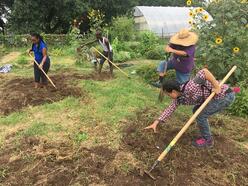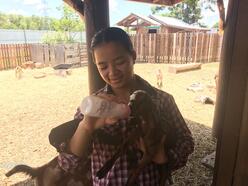One of the most pioneering programs at the IRC in Dallas is the New Roots program. This is the Food Security and Refugee Agriculture program within the International Rescue Committee. The program works to empower families by ensuring that they have access to affordable food through community gardening and nutrition education. This summer, the New Roots department selected three high school students from refugee families to be a part of the recently created Youth Food Justice Internship. This opportunity enabled marginalized youth in Vickery Meadow to gain knowledge and skills of the local food system, sustainable agriculture practices, and job readiness. The ultimate goal of this program was to use food and farming as a platform to practice and refine valuable work skills needed for future employment.
The Youth Food Justice internship equipped the students with practical skills, beginning in the application process and continuing throughout the six-week program. Yui Iwase, the New Roots Specialist, explained that the students had to apply and interview just as they would for any other job. This year’s candidates were Pay Pay, Moise, and Miriam. Pay Pay arrived from a refugee camp in Thailand in 2012, while Moise and Mariam arrived in late 2016 from refugee camps in Rwanda and Uganda, respectively. All three students came with their families and were resettled by the IRC in Dallas. This internship allowed the IRC to continue supporting families in the community and empower young former refugees.

While the internship focused on working in the gardens as well as the IRC office, there were also additional field trips to farms, food justice organizations, and local businesses. Their visits to the Texas Honeybee Guild and Texas Worm Ranch provided information about different roles in the ecosystem and how different organisms play into sustainability. They were also able to go to the Paul Quinn We Over Me Farm, Bonton Farms, and Our Savior Community Garden to learn about other farming and gardening techniques and see them in action.
At the end of their internship, they went to Eno’s Pizza Tavern where they “were allowed to watch and learn how a popular pizza joint operates during lunch hour and were invited into the kitchen to make their own pizzas by hand” (Rockey). You can read more about their time in the Eno’s kitchen in an article published in the Dallas Observer. These unique experiences provided the teens with different perspectives than they would have gotten otherwise this summer.
Pay Pay Lee, a rising junior and Karenni refugee from Burma, had nothing but positive things to say about her experience with the internship. While she had basic knowledge of farming and nutrition, she says that this experience helped her build on that immensely. Not only did she learn new information, but she has retained it and put it to use. Pay Pay now sees that this is an industry in which she can build a future and utilize at home as well. She also feels that her social skills have greatly increased through the internship. She came to the US four years ago, and Dallas is a very different environment from the Thai refugee camp she lived in. The adjustment has been difficult, but interacting with her peers, supervisors, and the community has given her a new confidence.

The Youth Food Justice internship was a great opportunity for Pay Pay and her peers. When asked if she would advise other students to apply, she said, “Of course!” and that this summer has been fun, challenging, and rewarding.
Story by: Josie Halozan & Sydney Cerza